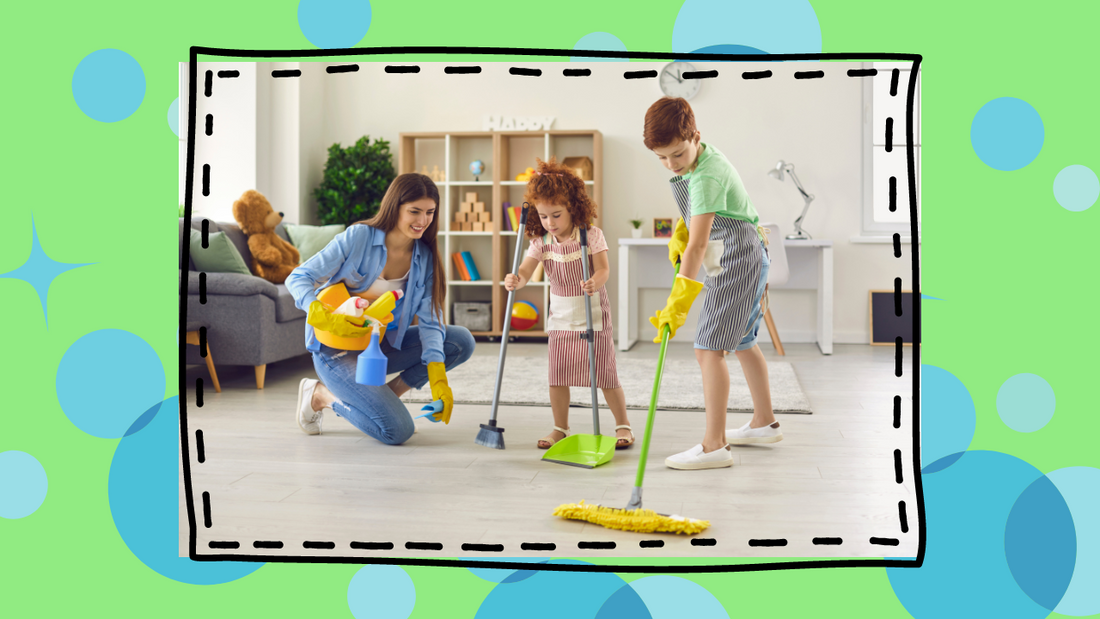
Why Every Child Should Learn Basic Home Economics Skills
Share
If there’s one thing I’ve learned while homeschooling my four kids on our homestead, it’s that there are a lot of life skills for kids that we, as parents, often take for granted. I don’t know about you, but I didn’t exactly grow up learning how to mend a sock or balance a budget. As a kid, I was more concerned with making sure my Tamagotchi didn’t die than figuring out how to cook a meal that didn’t involve a microwave. Fast forward to adulthood, and let’s just say, learning these basic home economics skills on the fly was...an adventure.
Now, I’m not here to shame anyone for not knowing how to sew on a button (believe me, I get it), but I am here to make the case for why teaching home economics should be a priority when we’re thinking about life skills for kids. If there’s one thing that’s become abundantly clear to me, it’s that these skills are not only practical but also vital in raising responsible, self-sufficient children. Plus, they might even prevent your kid from calling you in a panic from college, asking how to boil water. True story.
Why Home Economics? Isn’t That What Grandma Did?
When you hear "home economics," you might think of your grandmother whipping up a pie from scratch or making homemade jam with berries from the backyard. And while there’s definitely a nostalgic charm to that, home economics is so much more than just cooking and sewing. It’s about equipping kids with the tools they need to navigate the adult world, something that’s just as important today as it was back then—if not more so.
Life skills for kids go beyond just knowing how to clean a bathroom or whip up a batch of cookies. They include understanding how to budget, how to plan meals, how to manage time, and yes, how to do laundry without turning all your clothes pink. These are the skills that will help them run a household one day or at least survive living on their own without ordering takeout every night.
The Practicality of Home Economics
Let’s face it: Kids don’t just magically wake up one day knowing how to keep a house running smoothly. Trust me, I’ve tried. If your house is anything like mine, the kitchen often looks like a tornado blew through it, and don’t even get me started on the laundry situation. (Seriously, how do they go through so many clothes in one day? It’s like they’re in a constant state of costume change.)
Home economics is where the rubber meets the road in teaching kids practical life skills. It’s where they learn that there’s more to cooking than just dumping a box of mac and cheese into a pot. They learn how to plan meals, shop for groceries, and make nutritious food that doesn’t come from a drive-thru. They also learn about food safety, which, let’s be honest, is pretty important if you don’t want to end up with food poisoning because someone didn’t wash their hands after handling raw chicken. (I’m looking at you, kid number three.)

Money Matters: Teaching Financial Literacy
Another crucial aspect of home economics is financial literacy. This is one of those life skills for kids that can’t be overstated. How many of us grew up without a clue about how to budget, balance a checkbook, or understand credit? (Raises hand sheepishly.)
Teaching kids about money early on sets them up for success in the future. Home economics covers everything from basic budgeting to understanding how to save, spend, and even invest money wisely. It’s about teaching them the value of money and how to make informed financial decisions. Believe me, the earlier they learn this, the better off they’ll be. Otherwise, they might end up like I did in college, wondering why I couldn’t afford to eat anything other than ramen noodles. (Spoiler alert: It’s because I spent all my money on clothes.)
Responsibility and Independence
One of the biggest benefits of teaching home economics is that it fosters responsibility and independence. When kids learn to cook, clean, and manage a household, they’re not just acquiring skills; they’re also learning how to take care of themselves and others. These are life skills for kids that help them grow into capable, confident adults.
On our homestead, everyone has a role to play, and learning these skills has been a game-changer for our family dynamic. My kids are responsible for their chores, and they know that keeping the house running smoothly is a team effort. It’s not just about doing the dishes or sweeping the floor; it’s about understanding that we all contribute to the household, and everyone’s effort matters.
Plus, let’s be real: Teaching kids to be responsible for their own messes means less work for you in the long run. And who doesn’t want that?

The Joy of Self-Sufficiency
There’s something incredibly empowering about knowing how to do things for yourself. Whether it’s mending a pair of jeans, baking bread from scratch, or growing your own vegetables, these skills give kids a sense of accomplishment and pride in their abilities. Home economics teaches kids that they don’t have to rely on others to get things done—they can do it themselves.
And let’s not forget the satisfaction of seeing your kids apply these skills in real life. There’s nothing quite like watching your child confidently cook a meal for the family or fix a button on their shirt. It’s those moments that make you realize just how important these life skills for kids really are.
A Homeschooler’s Secret Weapon
As homeschool parents, we have the unique opportunity to tailor our children’s education to include these essential life skills. While traditional schools might not place as much emphasis on home economics, we can make it a priority in our own homeschool curriculum. And the best part? It’s hands-on learning at its finest.
Incorporating home economics into your homeschool routine doesn’t have to be complicated. Start small with age-appropriate tasks and build from there. Younger kids can learn basic chores like setting the table or folding laundry, while older kids can tackle more complex tasks like meal planning or managing a budget.
One of the things I love most about teaching these skills is that it’s a natural way to integrate other subjects. Cooking, for example, is a great way to teach math (measuring ingredients), science (understanding how yeast works), and even history (learning about traditional recipes). It’s STEAM learning in action, all while preparing your kids for the real world.
Making Home Economics Fun
Now, I know what you’re thinking: How do I make home economics fun? After all, convincing kids to do chores can sometimes feel like pulling teeth. But with a little creativity, you can turn these life skills for kids into engaging and enjoyable activities.
For instance, make a game out of grocery shopping by challenging your kids to find the best deals or stay within a budget. Turn cooking into a fun family project where everyone has a role, whether it’s stirring, measuring, or taste-testing. And when it comes to cleaning, why not crank up the music and turn it into a dance party? (Because let’s be honest, everything’s better with music.)
The key is to make these tasks feel less like chores and more like opportunities for learning and bonding. When kids see that home economics can be fun, they’re more likely to embrace these life skills and carry them into adulthood.

The Long-Term Benefits
At the end of the day, teaching home economics isn’t just about getting your kids to help out around the house (although that’s definitely a perk). It’s about equipping them with the skills they need to navigate life successfully. These life skills for kids will serve them well long after they leave the nest, helping them become responsible, self-sufficient adults.
So, if you’re like me and didn’t learn these skills until later in life, take heart. You have the chance to give your kids a head start. And who knows? You might even learn a few things yourself along the way.
After all, isn’t that what homeschooling is all about—learning and growing together as a family? And if it means a little less mess and a lot more self-sufficiency, then I’d say that’s a win-win.
Conclusion
Incorporating home economics into your homeschool curriculum is one of the best things you can do for your kids. Not only does it teach them practical life skills, but it also fosters responsibility, independence, and a sense of accomplishment. So, the next time you’re planning your homeschool lessons, don’t forget to make home economics a priority. Your future self (and your kids) will thank you.
